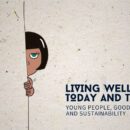Rapid developments in technology and unpredictable economies are destabilising employment as we know it. What are the possible solutions? Rapid developments in technology and unpredictable economies are destabilising employment as we know it. What are the possible solutions? It’s not the demand for human labour that is disappearing, Tim Jackson argues, but the institutions and economics to deliver it. This article first appeared in The Guardian and is part of its Optimistic thinking for 2017 series.

It is weird how worrisome work has become. Not that long ago, work offered us income, security, and a clear sense of our place in the world. My father worked in the same company for 40 years. They trained him, promoted him, supported his kids’ (my) education and left him well enough off to enjoy his old age. My mother was among a generation of women entering the workforce with a new sense of identity and purpose. Work mattered. Not just as the means to a livelihood but as the structure of everyday life; as the passport to citizenship.
Now everything is up in the air. AI is upon us. “The robots are coming”. Two distinct visions are battling it out for supremacy around this core narrative. In one, the robots will save us; in the other they will ruin us – and perhaps even become us eventually. Either we’ll live the life of Riley and never have to work again. Or else we’ll all be very poor – except for the very, very rich who produce and own the robots. One way or another our lives will change beyond recognition.
Pushed further, they’ll express a loss of hope for their own working future that’s not entirely without foundation. Youth unemployment in southern Europe reached 60% in the wake of the financial crisis, even before the arrival of the robots. That’s more than half of a whole generation with no secure livelihood and no sense of purpose. It’s a recipe for social disaster.
Recognising the dangers, the International Labour Organisation (ILO) has launched a two-year Future of Work initiative running up to its own centenary in 2019, with a huge, wide-reaching agenda. It’s a timely endeavour. Enormous human consequences hang on it. But the statistics are salutary.
Of those who do find work today, more than two-fifths will be in what the ILO calls “vulnerable employment” with non-existent or precarious contracts and limited access to any form of social protection. In developing countries that proportion rises to four-fifths. Equally telling is that two-thirds of those employed in developing countries still live in extreme or moderate poverty with an income of less than $3.10 a day. “Decent work for all” is perhaps the most fundamental of the Sustainable Development Goals (SDG 8). But its delivery is looking increasingly like a pipe dream.
What can AI bring to a world where basic security goes missing? Where healthcare is underfunded, education is a luxury and housing is precarious? What can it bring to the disenfranchised, disempowered communities of post-industrial countries, left behind by chronic underinvestment and falling real wages? I think of the young men we interviewed recently in Stoke-on-Trent. Trapped in a city whose identity was forged from coal and clay: now unemployed and potentially unemployable, after a decade of austerity. Inequality has deepened and political division has widened. The fallout is still falling on a government which misread the runes.
There aren’t many solutions for all this in the employment playbook. One of the few contenders is to embrace new technology as the cutting edge of capitalism and fix up the social fallout as best we can with a three-day week and a basic income. Since there won’t be any work, we won’t have to work. And since there won’t be any wages, we’ll need the government to pay us. Just one catch. With fewer wages, where will government tax revenue come from? How is all this to be funded?
Of course, we could tax land and property. Perhaps we should think about redistributing wealth. Maybe governments should take some ownership of productive assets (and robots). It would certainly make sense in the circumstances we are about to face but it doesn’t sound much like the cutting edge of capitalism. Not capitalism at all, in fact. Meanwhile, the ultra-capitalist version of the same scenario looks increasingly like a hideously divided world where work becomes less and less secure and the gap between capital and labour widens.
There’s a curious paradox at the heart of all this. I saw it in Greece and Portugal during the financial crisis. I’ve seen it in Stoke-on-Trent. I saw it in Africa and Asia in the 1990s. I saw it in Chile two years ago, where I was mugged at knifepoint by three youths working enthusiastically in the “informal economy”. The paradox is this: in the worst centres of unemployment in the world, there is still masses of work to be done.
Everywhere I went I saw the need for human labour. Sick people not getting cured. Kids neglected in classrooms. Buildings in need of renovation. A rising tide of mental illness. The encroaching sea of underinvestment. It wasn’t the demand for work that had gone missing, but the institutions (and economics) to deliver it.
And there is something else paradoxical about these unmissing jobs. They are in tasks like care and education, where human interaction matters most. Or in renovation and refurbishment, where making and repairing calls on skills that are resolutely human rather than machine. Or they are jobs that could brighten our lives and our hopes for the future, giving voice to our creative side and stimulating the imagination with skills and artistry only poorly reproduced by machines. In short, this economy is one potentially rich beyond our dreams in the need for human labour.




